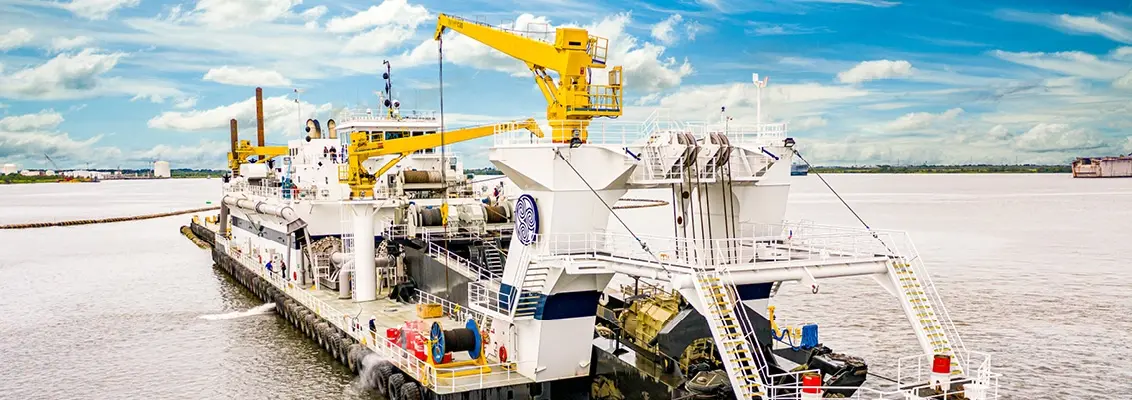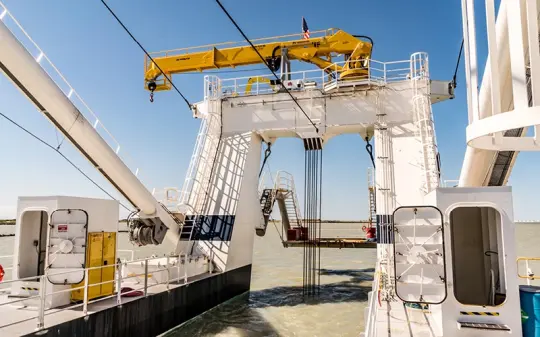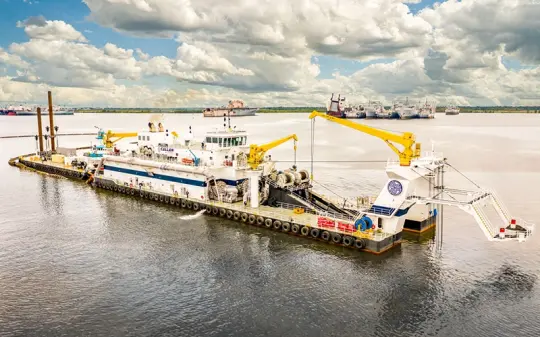Keeping Canals, Ports and Waterways Clear for Safe Passage
HELUKABEL partners with Callan Marine to power their floating dredge equipment

The shipping industry is only as good as the canals and waterways that allow cargo ships to pass through them and the ports where ships can load and unload valuable cargo. This was never more apparent than when the Suez Canal was blocked in early 2021 costing the world billions of dollars in trade each day this vital passageway was blocked.
Navigating deep oceans is much easier than traversing narrow waterways or shallow ports that can change by the minute as the water carries silt and other debris in the direction of the currents. To ensure that sea floors and banks stay at the proper depths and widths, dredging companies employ fleets of vessels to dredge seabeds to make waterways deeper to aid in navigation and prevent ships from running aground and becoming stuck. Additionally, removing sediment from the sea floor replenishes beaches by creating new habitats and recreation spaces. The added shorelines also enhance coastal protection from storms, such as hurricanes.
Powerful engine output of 24,000 hp
One such company, Callan Marine, located in Galveston, Texas along the Gulf Coast of the United States recently designed and built a 290-foot (90 metre) cutter suction dredge – the General MacArthur. The MacArthur is powered by three diesel engines generating a combined 24,000 hp. These provide the necessary electrical energy to drive two 6,900 hp electric motors, which in turn power the main deck pumps and two 2,500 hp electric motors, one for the underwater pump and one for the cutterhead. The opportunity to support Callan Marine arrived when the engineer designing the dredge consulted with the Italian electric motor manufacturer about the best choice for sourcing cable for the project. The motor manufacturer suggested HELUKABEL because they had worked with them on many successful projects in Europe.
HELUKABEL initially started its development of the cabling system design with the underwater pump and cutter motors power section. “One of the biggest challenges in building the General MacArthur was finding the appropriate submersible cable for the high ampacity demand from these motors,” describes Stanley Hamidjaja, Automation Manager at Callan Marine. The cables run through a structural arm (the ladder) that submerges both of the motors. It was not possible to achieve the necessary capacity using a single cable for each phase.

HELUKABEL initially started its development of the cabling system design with the underwater pump and cutter motors power section. “One of the biggest challenges in building the General MacArthur was finding the appropriate submersible cable for the high ampacity demand from these motors,” describes Stanley Hamidjaja, Automation Manager at Callan Marine. The cables run through a structural arm (the ladder) that submerges both of the motors. It was not possible to achieve the necessary capacity using a single cable for each phase.
“The team at HELUKABEL was very involved for over a year in submitting and resubmitting their proposal until they provided the cable specification and quality to our satisfaction,” Hamidjaja remembers. Working with Callan Marine’s engineering team, HELUKABEL was able to provide eight AWG4/0 cables per phase, which equated to 32 cables total being used to provide the necessary power. These cables had submersible ratings up to 10 bars of pressure and the necessary American Bureau of Shipping (ABS) approval that is required for cables to be used on ships and offshore structures.
Custom sealing inserts for cable glands

The next challenge was to assist in designing the necessary water-tight transition box for the system that would also terminate the braided shields of the VFD cables. We accomplished this by designing the transition box to include our KVA-XXLMS metal cable glands and KVA-XXLMS-E EMC cable glands that are rated for 10 bars or 328 feet (100 metre) submersion depths. These glands are designed to accept cables with large outer diametres. What made these glands even more unique was the need for a custom insert to ensure the necessary strain relief and water-tight seal existed between the gland and cable as the AWG4/0 cables used had overall diametres that were not in the range of the standard inserts. Design, manufacturing, and delivery of the custom gland inserts occurred in under eight weeks.
Callan Marine is extremely satisfied with HELUKABEL's support. “The General MacArthur is a game-changer vessel in the dredging industry and we are proud to have HELUKABEL as a valued partner in providing quality, dependable cable,” explains Stanley Hamidjaja. “We appreciate the close cooperation in providing us with the appropriate solutions required by this challenging application.” Other products that were needed to complete dredging-related tasks aboard the cutter included various sizes of nickel-plated cable glands suitable to withstand up to 10 bars of pressure along with some category 7 data cables that had Lloyd’s Register marine and offshore approvals.
After the General MacArthur came out of dock, it was sent off to the Gulf Coast for its first assignment to keep the vital shipping lanes near Texas clear for the continued safe passage of marine vessels.
About the General MacArthur
| Dimensions: | Engine Power Data: |
|
|
| Operating Parameters: |
|
| Accommodations: |
|
About Callan Marine
Callan Marine, LTD. is a Texas-based, privately-owned dredging and marine construction business founded in 2009. Callan Marine performs dredging projects for both private and public clients by providing services to restore berthing depths for ship docks, navigation channels, or otherwise facilitate transportation in waterways throughout the United States. For more information visit www.callanmarineltd.com .
You can also find this and many other exciting articles in the current issue #13 of our customer magazine POWER. Read it now !
